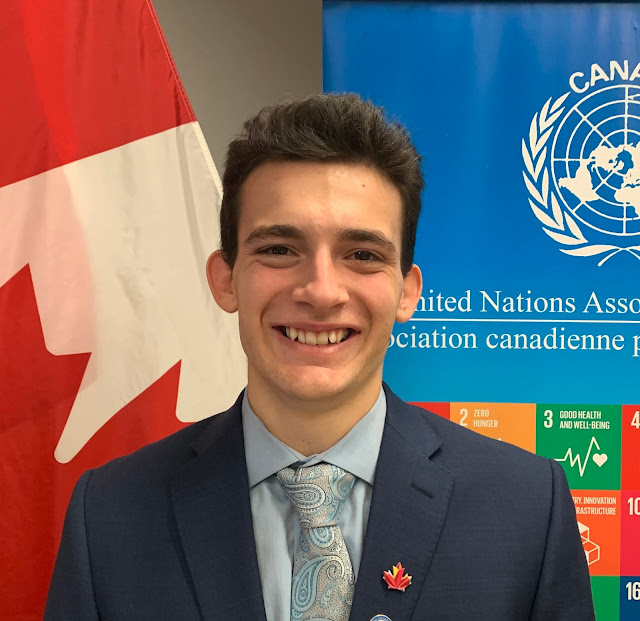Ahmed's Journey at the GFMD in Quito, Ecuador
Ahmed's Journey at the GFMD in Quito, Ecuador
By
What does perspective
mean? It seems to be a word that commonly accompanies any activity, event or
goal as a means to “cover all their bases”. Perspective, in this context, works
wonders to help the layperson attach themselves to a worthwhile goal. What’s
missing frankly, and not for lack of effort, is the ‘how.’ How does one achieve
the ability to take another person’s perspective, is it throughe asking,
visualizing, travelling? For the longest time when I would encounter pople
from completely separate situations and I was tasked with understanding their
life story, needs, desires and goals I felt stuck. For some context, I’m in my
third year of my undergraduate degree in Health Sciences and have created my
own humanitarian-focused organization in 2016 with various other
extracurricular activities thrown in the mix. Throughout these humble years,
I’ve never had an issue with mentally walking a mile in one’s shoes, but it was
not until I was proposed an experiment by a dear friend of mine that I woke up.
His proposal was to see ‘the dress’ and asked me its colours. This was at the
midst of ‘the dress’ craze and it was then that I was first exposed, seeing it
as ‘white and gold’. We spent the rest of the time arguing over how insane the
other must be for seeing it any other way. In an odd turn of events later in
that same day I saw it as ‘black and blue’ and ever since I’ve never seen it
the other way since. Now definitely a rather trivial experience, but the
fundamental lesson that my friend inadvertently taught me was that, at its
roots, perspective is more than just imagining what the other is saying, it’s
understanding that even at the most basic level we even ‘see’ life differently.
Now, to fast forward
a few years, I have been invited by the United Nations Association in Canada
(UNA-Canada) to act as a delegate for three conferences all integrated under
the larger umbrella of the Global Forum for Migration and Development (GFMD).
The forum this year was hosted in Quito, Ecuador, the capital of a country
nestled in between Peru and Columbia, and the epicenter of a major mass
migration event. The GFMD itself was populated by the various UN organizations
and my fellow delegates and I in tandem represented UNA-Canada and the United
Nations Major Group for Children and Youth (UNMGCY). From the moment I landed
to the time I was off to Canada, I had it firmly nestled in my mind that I
would take this opportunity to gain perspective. Now I did not mean to just
approach my goal traditionally, I wanted to use my time to focus on the senses,
feelings and repressed voices of the various leaders and other individuals I
met along my way.
I met with world
leaders, mayors from major cities, high level UN officials, youth leaders and
activists producing incredible change throughout the world. Every day I set out
to discuss or talk about a subject that I felt the other person was not only
qualified to talk about, but could passionately talk about until to their last
breath. I wanted to hear the ‘why,’ why they pursue their goals relentlessly,
why choose the path they do and why make the changes they hope to see in the
world. My journey to perspective also had me engaged in lengthy discussions with
locals, refugees and citizens alike to discuss what they felt was ignored by
their media. It didn’t seem enough for me to taste their food and observe their
way of life in an effort to gain an understanding of culture. At the basis of
all of that was the people themselves, their motivations and their goals. The
restaurant owner just a few hundred meters away from the conference wasn’t just
confined by their occupation, they were someone who had endless stories to tell
about their experience as an indigenous person. Or the humanitarian lawyer that
could go on for hours about Football (Soccer) or if prompted, the Venezuluen refugee crisis. Despite the varying level of relevance these conversations were
to my subject matter of interest, I was still learning.
At the core of the
lengthy and sometimes irrelevant conversations I would consistently have was
passion. Every individual I talked to, when prompted to communicate what drove
them and how they seek change simply exuded a passion I saw shared among the
conference goers and locals alike. It offered me a greater understanding that
while there may not be any universally shared perspective, there is underlying
everyone a passion somewhere for meaningful change. My own experience as a
refugee even felt similar to the Venezuluen refugee story. At the end of the
conference, I had spent my time feverishly talking and listening to anyone that
would bare my admittedly lackluster Spanish, I can confidently say I succeeded
in my goal. As I sit and type weeks later, I realize that perspective taking
can’t be confined to the likes of a goal to “network with others”, it’s a
fundamental part of being human.




Comments
Post a Comment